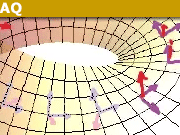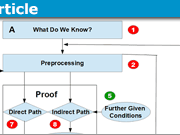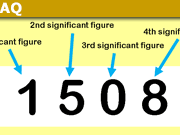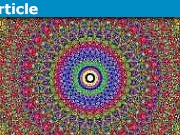Why Do People Say That 1 And .999 Are Equal?
Why do people say 1 and 0.999… are equal? Aren’t they two different numbers?
No, they really are the same number, though this is often very counterintuitive to many beginning students. Here are some non-rigorous proofs that 1=0.999…:
Proof #1
For any two unequal numbers, there is always another number in between them. (That is intuitively obvious, and can be pictured on a number line, which will be familiar to many people.) Therefore, if 0.999…. and 1 are different, there must be another number in between them. But there is no way to write a number that is greater that 0.999… and less than 1 in decimal notation.
Proof #2
First, we put
[tex]\ x = 0.999…[/tex]
Multiplying by 10 gives us
[tex]\ 10x = 9.999…[/tex]
But then
[tex]\ 10x-x = 9.999…-0.999…,[/tex]
thus
[tex]\ 9x = 9[/tex]
Hence we get that
[tex]\ x = 1[/tex]
Proof #3
If you accept that 0.9999… is a number, then how much less than 1 is it? It’s larger than 0.9999, so it’s less than 0.0001 less than 1. But it’s also larger than 0.9999999, so it’s less than 0.0000001 less than 1. So the difference between 0.9999… and 1 is less than 0.00001, 0.000000001, or 0. any number of 0s followed by 1 … so the difference must be zero. If you accept that two numbers whose difference is 0 must be the same, then that proves that 0.9999… = 1. If you don’t accept that, and you think that two different numbers can have a difference of zero, then you’re in an ‘extended number system’ that has more numbers than we normally use.
Proof #4
First, we have that
[tex]\ 1/3 = 0.333…[/tex]
If we multiply things by 3, then we get
[tex]\ 1=3\times (1/3) = 3\times (0.333…) = 0.999…[/tex]
All of these proofs are correct, but they are not rigorous. For example, how do we know that [itex]3 \times (0.333…) = 0.999…[/itex]? This is not that obvious if we think about it. A more rigorous proof is given in the post following this one.
Some further questions you might have:
But 1 cannot equal 0.999…, as every number can only have one representation!
Well, the thing is that this is just a misconception that is simply not true. Numbers can have many representations. For example,
[tex]\frac{1}{3}=\frac{2}{6}=\frac{3}{9}=0.333… ,[/tex]
but somehow, many people don’t have any problems with this thing. The same thing happens to 1=0.999… really, it’s just another way to write the same number. Does this make our number system ugly? I understand that you might think that, but that’s just something we need to accept. Not having that 1=0.999… would make our number system much uglier!
The way I see it, is that 0.999… gets closer and closer to 1, but never quite reaches 1.
This reasoning appears a lot and apparently, many people see 0.999… as some kind of process that gets close to 1. But this is not quite what mathematicians mean with 0.999…
Mathematicians say that 0.999… is a number, just like 2 and 3. So phrases like “it gets close to 1, but never reaches 1” are meaningless. It’s the same as saying 1 gets closer and closer to 2, but never quite reaches 2. This sentence makes no sense, and the same thing happens with 0.999…
Can we define number systems such that 1=0.999… does not hold?
Of course! But these number systems are not as useful, because they don’t conform to our intuition about numbers and limits.
In Proof #2, you say 10x=9.999… But this 9.999… has one fewer nine than 0.999…
Another popular argument. This time, the confusion arises from not grasping infinity. 0.999… has an infinite number of nines. If we somehow remove a nine from this sequence, then we would still have an infinite number of nines. So there are an equal number of nines in 0.999… and 9.999…
The same thing happens here: consider two sets of numbers, A and B, where
[tex]A=\{0,1,2,3,4,…\}[/tex]
and
[tex]B=\{1,2,3,4,…\}[/tex]
Both sets are infinite. Actually, both sets have an equal number of elements. But A doesn’t contain 0, so it has one fewer element than B? Yes, but this reasoning only applies to finite sets. For infinite sets, it’s quite possible to have one element less and still have an equal number of elements. Indeed, consider the following correspondence:
[tex]0\leftrightarrow 1,~1\leftrightarrow 2,~2\leftrightarrow 3,~3\leftrightarrow 4,…,~n\leftrightarrow n+1,…[/tex]
So for an element n in A, there exists a unique element in B that corresponds to n, namely n+1. This means, by definition actually, that both sets have the same number of elements.
Read this supportive article: https://www.physicsforums.com/insights/is-there-a-rigorous-proof-of-1-0-999/
Maybe we should just abandon our base 10 number system and move to a number system where every number has a unique representation.
Tempting, but sadly this is not possible. The problem arises in every base! For example, in base 2, we have [itex]1=0.111…[/itex]. There is no way around it.
The following forum members have contributed to this FAQ:
AlephZero
Fredrik
micromass
tiny-tim
vela
This article was authored by several Physics Forums members with PhDs in physics or mathematics.








[QUOTE=”Kegan, post: 5383108, member: 584906″]yeah that does make more sense so what you saying is that .999… to infinity approaches the number 1 so close it is consideribly the same number is that what you are saying ?[/QUOTE]
No, .999… is NOT a sequence. It is a number. The … means that the value of the number is equal to the limit of the sequence (.9, .99, .999, …). If it helps, you can think of it as the term of the sequence in which n=infinity. The value of this term, by definition, will be the limit of the sequence as n approaches infinity. If you do not understand this, look up limits.
[QUOTE=”Mark44, post: 5383152, member: 147785″]No, .999… doesn’t approach 1 — it is exactly equal to 1.
The limit of the sequence {.9, .99, .999, …} is 1, which means the farther you go in the sequence, the closer a number in the sequence is to 1.
BTW, it’s redundant to write “to infinity” after .999… The dots (an ellipsis) already means that the 9 digits repeat endlessly.[/QUOTE]
Ok that makes sense the more 9’s you have the closer it is to the number 1 ,and i’m only eleven and language arts is not my best subject
[QUOTE=”Kegan, post: 5383131, member: 584906″]what bothers me they don’t have physics in the 6th grade[/QUOTE]
You can’t understand physics without having at least a competency in algebra, or better yet, calculus.
[QUOTE=”Kegan, post: 5383135, member: 584906″]and no quantum physics in high school[/QUOTE]
But they do have regular (or Newtonian) physics in high school. I took that when I was a senior at my high school.
[QUOTE=”Kegan, post: 5383108, member: 584906″]yeah that does make more sense so what you saying is that .999… to infinity approaches the number 1 so close it is consideribly the same number is that what you are saying ?[/QUOTE]
No, .999… doesn’t approach 1 — it is exactly equal to 1.
The limit of the sequence {.9, .99, .999, …} is 1, which means the farther you go in the sequence, the closer a number in the sequence is to 1.
BTW, it’s redundant to write “to infinity” after .999… The dots (an ellipsis) already means that the 9 digits repeat endlessly.
[QUOTE=”Kegan, post: 5383135, member: 584906″]and no quantum physics in high school[/QUOTE]
i really want to go to california institute of technology
[QUOTE=”Kegan, post: 5383131, member: 584906″]what bothers me they don’t have physics in the 6th grade[/QUOTE]
and no quantum physics in high school
[QUOTE=”Kegan, post: 5383129, member: 584906″]yeah im 11 i like physics and math[/QUOTE]
what bothers me they don’t have physics in the 6th grade
[QUOTE=”WWGD, post: 5383127, member: 69719″]Gauss name is commonly mentioned in Physics. Still, between 10 and 20. Right?[/QUOTE]
yeah im 11 i like physics and math
[QUOTE=”Kegan, post: 5383126, member: 584906″]oh ok im more of a quantum Phyisics guy and how old do you think i am please let me know[/QUOTE]
thanks for the link that was really cool i did not know that
[QUOTE=”Kegan, post: 5383126, member: 584906″]oh ok im more of a quantum Phyisics guy and how old do you think i am please let me know[/QUOTE]
Gauss name is commonly mentioned in Physics. Still, between 10 and 20. Right?
[QUOTE=”WWGD, post: 5383123, member: 69719″][URL]https://en.wikipedia.org/wiki/Carl_Friedrich_Gauss[/URL]
Maybe the best Mathematician of all times. Hope he is not pissed I am using his name.[/QUOTE]
oh ok im more of a quantum Phyisics guy and how old do you think i am please let me know